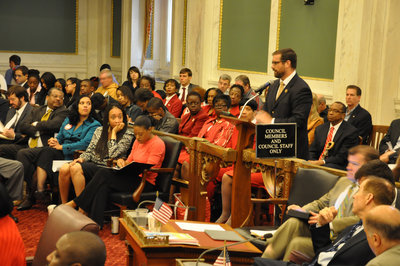Philadelphia City Council passed a first-of-its-kind LGBT equality bill April 25.
Bill 130224, which passed in a 14-3 vote, would not only give a tax-credit incentive to businesses that offered employee health plans that would include same-sex partners and children, but it would also include a substantial amount of landmark benefits for the transgender community as well.
The bill, introduced by Councilman Jim Kenney, would revamp the city’s health-care plan to ban discrimination against non-union transgender city employees and would instate a Transgender Health Tax Credit that would encourage companies to offer transgender-specific health-insurance coverage to the transgender community.
City buildings would also be required to provide gender-neutral bathrooms, and the measure would also clarify what constitutes employment discrimination in the city’s nondiscrimination law.
The bill won with a near sweeping victory, with Councilman-at-Large Bill Green being the only Democrat to vote against it. Republican Councilmen-at-Large David Oh and Brian O’Neill voted against the bill.
A number of LGBT community members testified to the benefits of the bill.
Transgender advocate Jordan Gwendolyn Davis said the bill would address many of the issues the transgender and gender non-conforming communities experiences on a day-to-day basis. Davis said she moved to Philadelphia after she experienced transphobic attitudes in Pittsburgh in regards to both bathroom usage and within the homeless-shelter system.
“You all have nothing to fear by me or any other transwoman entering the women’s room or being in any other women’s space,” she testified. “While cisgender women have nothing to fear by transwomen being in women’s spaces, transwomen have a lot to fear by being forced in men’s spaces, due to an endemic rape culture within. Although I wish that the protections in this bill in gender-segregated spaces went beyond bathrooms, I believe it is a good start.”
Davis added that the bill would help promote the safety and well-being of the transgender and gender non-conforming communities.
“I believe in the ability of people to evolve, and I hope that every member of City Council is now evolved, not just on the LGB part, but the T as well,” she said.
Dane Menkin, a certified registered nurse practitioner at Mazzoni Center, testified along with his wife and daughter. Menkin, who has been legally married to his partner for four years, said the protections included in the bill would be a tremendous help to his family.
Menkin, who is a transgender male, has legally changed his name, birth certificate, driver’s license and passport to reflect his gender identity, however his health insurance did not cover anything related to his transition and still labels him as female.
“This has had an impact on my family, both financially and in terms of social and physical safety,” he said. “When a provider, billing specialist or receptionist sees me and when my daughter refers to me as daddy when speaking to me, they immediately become concerned that either my gender marker in their system is wrong or that we engaged in some kind of fraud.”
State Rep. Brian Sims (D-182nd Dist.) said he hoped council would make it a historical day for Philadelphia, which he said has long celebrated diversity.
“We are a city that doesn’t hide from its diversity, but instead celebrates and proudly displays our cultural, ethnic, sexual, and gender diversity every day for the world to see. It is the Philadelphia way,” he said.
Sims said the city has supported and protected its lesbian, gay and bisexual citizens for 30 years and began making moves to protect the transgender community more than a decade ago.
“Quite literally, we are at our best when we are celebrating and embracing our diversity and it’s no surprise that pioneers of the LGBT civil-rights movement chose Philadelphia to proudly proclaim that we are here, we are equal and we deserve the same rights afforded to all of our brothers and sisters,” he said.
Sims said there is frequent debate on whether the community should be labeled “LGBT” or “GLBT,” but he noted the importance of all community members.
“If we were actually listing the members of the LGBT community in order of importance, in order of how hard they worked and of how much farther they have to go, we would be the TLGB community,” he said.
Green said he was proud of the record the Council has had in supporting the LGBT community and said he supports almost every aspect of this bill, including all the rights and protections in the bill — but he said he had concerns about fiscal issues.
“I believe that the tax credit is a waste of money because it will go to corporations that already provide this kind of thing,” Green said.
Kenney said the tax credit would not go to companies who offer benefits to same-sex partners, but would act as an incentive to those who do not.
“The bill does not permit tax credit for companies who offer same-sex benefits now, but this is companies who need to get there, but don’t offer them now. It is an incentive,” he said.
Kenney thanked those who worked hard for the bill, including his staff and LGBT community leaders and said he looked forward to providing equality for all citizens.
“We are continuing on the America road to full equality and civil rights for all our citizens,” he said.
Joining Kenney in voting for the measure were Councilmembers Mark Squilla, Kenyatta Johnson, Jannie Blackwell, Curtis Jones, Darrell Clarke, Bobby Henon, Maria Quinones-Sanchez, Cindy Bass, Marian Tasco, W. Wilson Goode, William Greenlee, Dennis O’Brien and Blondell Reynolds Brown.
The bill will now head to Mayor Michael Nutter’s office for signature.
